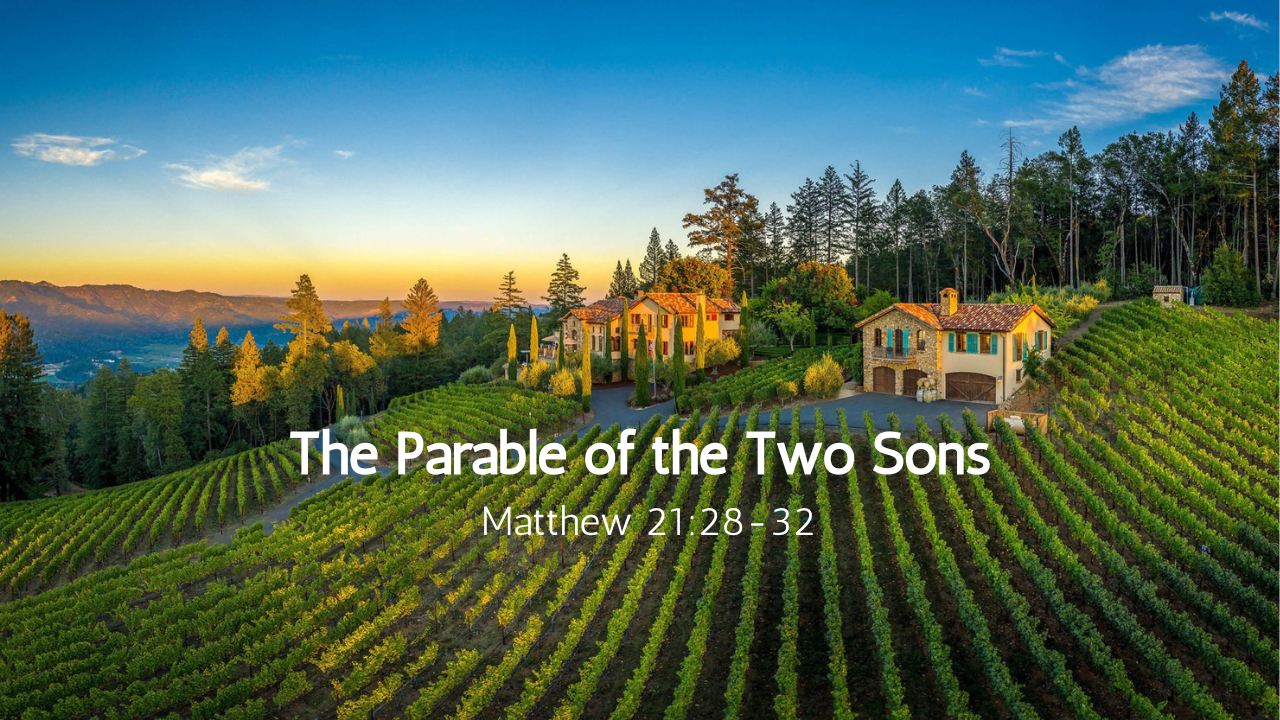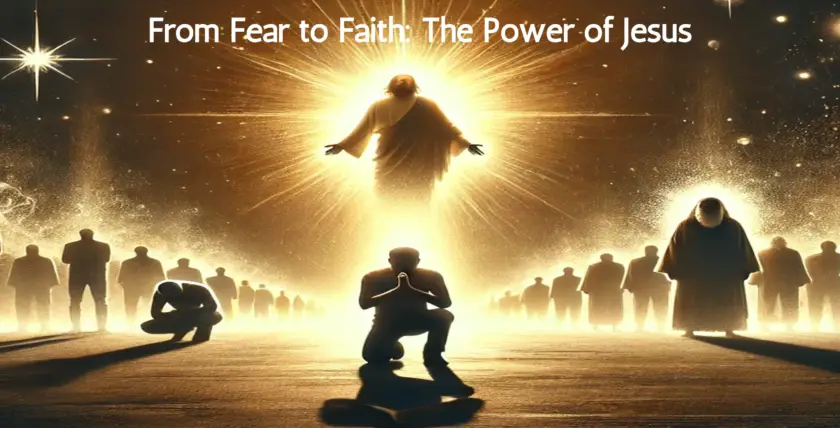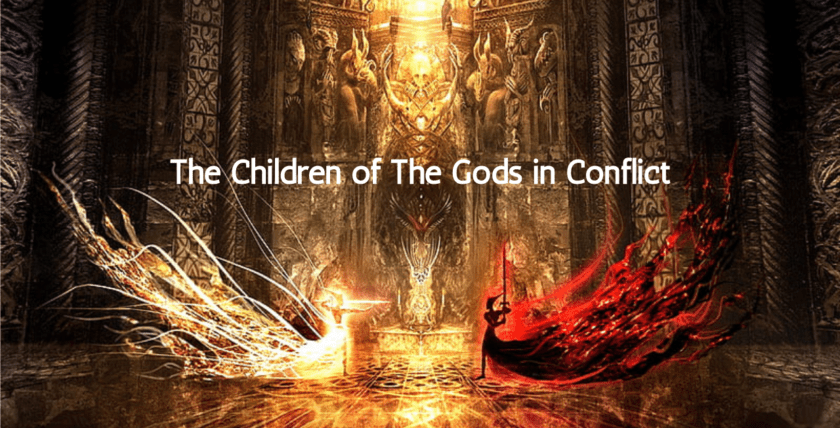As we’ve been going through the parables of Jesus, in this video, I will speak about *The Parable of the Two Sons found in the Gospel of Matthew. This isn’t the two sons from the parable of the prodigal son. These are a pair of different sons and a different father. In this parable, there are two questions that Jesus puts forward to his audience. The first question is, “What are your thoughts? Is it God’s will to be religious or believe? And the second question is, “Can people change?” Jesus doesn’t ask these two questions specifically, but you’ll see he implies the questions.
Like the parables of the Hidden Treasure and the Priceless Pearl in the previous episode, this parable is only found in Matthew’s Gospel. Therefore, since Matthew’s Gospel was written to a Jewish audience, his readers should be well aware of the points being made by the story (Matthew 21:28-32).
I’ll remind you here that as you go through the parables, you must always look at the context of the parable to understand the points Jesus is making. We have the context for this parable in verses 23 through 27. Jesus went to the temple and was teaching. As he was teaching, the chief priests and elders of Jerusalem confronted him and asked him where he gets the authority to teach and do all the things he’s been doing. They’re basically saying Jesus wasn’t one of them. He wasn’t a member of their elite religious club. They tried to intimate Jesus, get him to stop teaching, and leave the temple.
This is what religious people do. These Pharisees, priests, and lawyers walk around in their robes and their fancy hats as a sign of intimation toward the everyday Israelites. By their attitude and attire, they declare how special they are compared to others. Of course, religious people don’t do that today, right? Some Christians don’t make non-Christians feel inferior to them.
But Jesus wasn’t intimated by them. Instead, he turned the tables on them and said he’d tell them by whose authority he teaches if they could tell him if the message and work of John the Baptist was from heaven or from man. But the priests and elders and lawyers figured out that if they said John’s teaching was from heaven, then Jesus would ask why they didn’t believe him, and if they said John’s teaching was from man, the people would come after them because they all believed John was a prophet. So they punted his question and said they didn’t know where John’s teaching was from. But they did know because they could never accuse John of anything. We all know that pretending not to know the truth is no excuse for ignoring the truth. We all know when we hear or see the truth of God. Like these priests and lawyers, we can run, but we can’t hide from the truth.
Jesus knew they knew John’s message was from God, but since they wouldn’t answer him, he told them he wouldn’t tell them where his authority comes from either. Instead, he tells them this parable of the two sons.
The parable’s characters are a father, who represents God, and two sons, representing two classes of Israelites, the religious and everyone else. The father asks the first son to go into the vineyard and work. It is important to note here that the first son the father approaches is actually the second son or the younger son. In the Jewish family structure, the younger son would be required to perform manual labor before the eldest or first son. But since the younger son refused to work in the vineyard, the father went to the eldest son, or the second in the parable, and asked him to work in the fields.
So it makes sense that the eldest son said, “Yes, sir. I’ll do what you want, Dad.” After all, he’s the eldest; he’s the special child, the one who will inherit everything from the father. But even though he knows his father’s will and he says he’ll do what his father wants him to do, he doesn’t do it.
But, the younger son, the son without the privileges of his older brother, the son usually intimated by the first son, changes his mind and does the will of his father.
It would be clear to the Jews listening that Jesus is saying the priests and elders are like the Son, who gave lip service to the Father but didn’t do what the Father asked. It would also be clear by the parable’s conclusion that the tax collectors and prostitutes are like the son who initially disobeyed his father but then repented and did the will of his father.
The message of John the Baptist was it was God’s will for the Israelites to repent and prepare themselves for the coming Messiah. But even though they knew the law of Moses, the priests and lawyers were only giving lip service to following the will of God. They were observing the letter of the law, but they were blind to the spirit of the law. They were telling God, “Yes, sir,” and then not doing God’s will. They weren’t doing God’s will because they weren’t loving their neighbor. They weren’t showing mercy and compassion toward others. They didn’t believe that Jesus was the Christ.
But the tax collectors and prostitutes, and every other person categorized by the priests and elders as sinners, believed the message of John, and they repented and were preparing themselves for the coming Messiah, as God willed through John.
Therefore, Jesus told the priests, elders, and lawyers that the sinners, as they saw them, would precede their religious selves into the kingdom of God. Why will sinners enter God’s kingdom before the religious priests and elders? Like the son who refused to do the father’s will and then repented, the tax collectors and prostitutes realized their disobedience and sin. They repented and believed the message of forgiveness through Jesus Christ. But the religious leaders, who only act like they’re doing what God wants them to do, don’t see their need to repent and, therefore, don’t need forgiveness from Jesus Christ.
Let’s return to the first question Jesus asked when telling the parable, “What do you think?”
“What’s your thoughts? Is it God’s will to be religious or believe? Is it better to have religion or faith? The priests, elders, and lawyers had religion but didn’t believe John or Jesus. Why couldn’t they believe it? Because they were special. They had their religion, and Jesus as the messiah didn’t fit their dogma. However, the tax collectors, prostitutes, and sinners had no religion that interfered with believing in Johns’s message that Jesus was the Messiah. The religious leaders followed the letter of the law and doctrines of holiness and righteousness but didn’t do the will of God by having faith in His Son. No one is saved by religion. Only having faith in Jesus Christ is doing the will of the Father. Can going to church and singing hymns and listening to preaching and giving money save you? No, if you don’t have faith in Jesus. God’s will is going into the vineyard and fields with a gracious and repentant heart and doing the work of faith by telling others why you believe in Jesus Christ as your savior.
This brings us to our second question; “Can people change?” When Jesus asked the priests and elders which of these two sons did the will of the Father, the answer was the first. But the first initially said he wouldn’t work in the vineyard. The first son changed his mind and repented. Did Jesus tell this parable of the two sons to condemn the priests, elders, and lawyers? No, he told them the parable so they would repent and actually do what he wanted them to do by believing in His Son.
In the parable of the two sons, Jesus was emphasizing to the priests, elders, and his disciples that faith in God and following His will by believing in the Anointed One, the Messiah, the Christ, is better than following a religion and hiding from the reality that we are all sinners and in need of salvation through Jesus Christ.
I hope this parable of the two sons inspires you to seek faith before religion and forgiveness before judgment. We wrestle with our sins and shortcomings, and we all need forgiveness from Jesus Christ by believing in Him.


